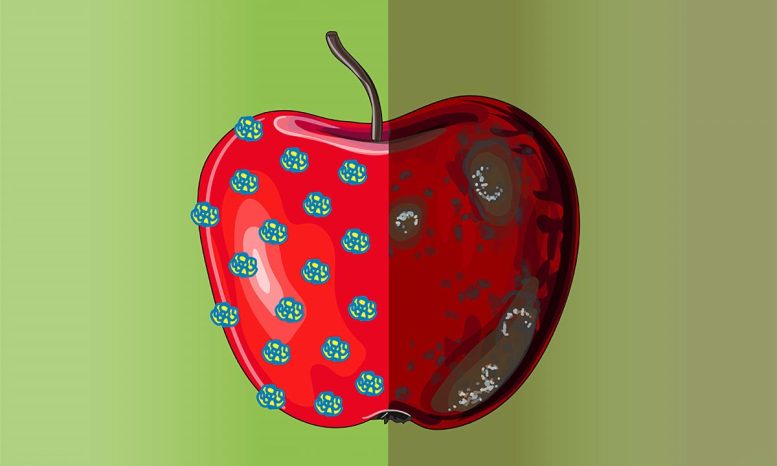
Many fruits and vegetables already have a layer of food-grade wax that is applied for cosmetic reasons and to prevent water loss. This method combines such wax with nano-encapsulated cinnamon-bark essential oil in protein carriers to enhance them with antibacterial properties. Credit: Texas A&M University Engineering
A groundbreaking wax coating developed by researchers uses cinnamon-bark essential oil to enhance produce safety, showing promise in reducing foodborne illnesses and extending shelf life.
Dr. Mustafa Akbulut, professor of chemical engineering, has teamed up with horticultural science professor Luis Cisneros-Zevallos to engineer longer-lasting, bacteria-free produce.
According to Akbulut’s recent publication in Current Research in Food Science, the global fruit and vegetable market loses over 50% of agricultural fruit production during various stages of produce handling and post-harvest treatments.
Revolutionary Wax Coating
Many fruits and vegetables already have a layer of food-grade wax that is applied for cosmetic reasons and to prevent water loss. Akbulut’s research combines such wax with nano-encapsulated cinnamon-bark essential oil in protein carriers to enhance them with antibacterial properties.
“We are living in an age where technology has advanced so much,” Akbulut said. “However, the food industry has not competed with these advances, and there are continuous problems with food safety. News about foodborne diseases and outbreaks reporting hundreds of people becoming sick from unhygienic food frequently appears at the national level.”
Akbulut’s wax coating technology bolsters the safety of fresh produce and provides enhanced protection against bacteria and fungi. This composite coating provides both immediate and delayed antibacterial effects, according to the article.
Foodborne pathogens are especially problematic for fruits and vegetables that are consumed raw or minimally processed due to the lack of high temperatures that can inactivate them.
Development of this coating gives better understanding of the interactions between the wax and undesired microorganisms, Cisneros-Zevallos said.
Potential Industry Use
“I think that the impact that these wax coatings will have on the industry is very big because the industry is looking for new technologies,” Cisneros-Zevallos said. “This is one of those tools that we are developing that could actually help the industry face these challenges against human pathogens and spoilage organisms.”
Nano-encapsulated essential oil makes it harder for bacteria to attach and survive on fruits or vegetables. The delayed release of the essential oil increases the half-life of active ingredients and produce compared to its unencapsulated counterparts, according to the article.
“When bacteria are exposed to essential oil it can break down the bacterial wall,” Akbulut said. “This technology is going to basically help us inactivate the bacteria and fungi to extend the shelf life.”
Doctoral student Yashwanth Arcot ran experiments to support the research.
“This coating was also inhibiting the fungal attachment,” Arcot said. “We have tested this system against Aspergillus, a fungus responsible for the spoilage of food commodities and the onset of lung infections in humans. We were successful in preventing its growth on the hybrid coatings.”
Arcot said this is the first development of hybrid technologies for killing bacteria and fungus using nano-encapsulated essential oil in food waxes.
The chemicals used to produce this hybrid wax are antibacterial agents that are FDA-approved.
“These hybrid wax coatings are easily scalable and can be implemented in food processing industries,” Arcot said.
Reference: “Edible nano-encapsulated cinnamon essential oil hybrid wax coatings for enhancing apple safety against food borne pathogens” by Yashwanth Arcot, Minchen Mu, Yu-Ting Lin, William DeFlorio, Haris Jebrini, Angela Parry-Hanson Kunadu, Yagmur Yegin, Younjin Min, Alejandro Castillo, Luis Cisneros-Zevallos, Thomas M. Taylor and Mustafa E.S. Akbulut, 1 January 2024, Current Research in Food Science.
DOI: 10.1016/j.crfs.2023.100667
Additional contributors to the research include Dr. Matthew Taylor from Department of Food Science and Technology, Dr. Younjin Min from the University of California, Riverside, and Dr. Alejandro Castillo from the Department of Food Science and Technology.
This research received partial funding through the Food Manufacturing Technologies Program provided by the United States Department of Agriculture (USDA). Additionally, funding comes from the USDA National Institute of Food and Agriculture – Specialty Crop Research Initiative.









Be the first to comment on "Wax On, Bacteria Off: The Future of Fresh Fruits and Vegetables"